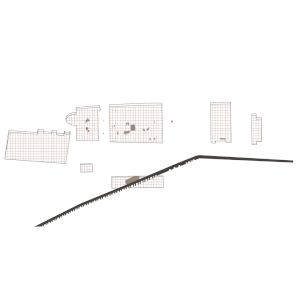Newfoundland Forays
Project team: Anna Longrigg, Jason McMillan
The large scale boom and bust economies of fish, oil and tourism are hugely problematic for outports, which fall victim to economic mono-cultures. All three are resource based economies, who’s value is contingent on sweeping global trends, external to Newfoundland. Paradoxically, the continued function of outports, and the potential for growth demands centralization and large scale thinking, which runs against the intensely local cultures of the towns. The sharing of resources is a necessity for the survival of the declining populations.
The abandoned fisheries are relics of not only great prosperity, but also the great failure of mega-economies in these towns. Our appropriation of the fishery will create a regional hub for food security and community life, subverting generalization while generating valuable bi-products and diversified micro-economies. The fishing plant is a megalith relative to the towns, and the architecture subverts and divides its presence on the site.
Fueling Outports adds resiliency directly to electricity, food and waste networks in the region. Indirectly, cultural exchange and community building are products of the interaction of each node with its respective town, and amongst the network of nodes.
Bonavista Peninsula / Regional Strategy
The cast of characters tied together are diverse and vast. At the largest scale, the projects conception is deeply tied to the constellation of governments and government agencies which input support into the island. Grant organizations such as ACOA and non-profit partners in the Food Security Network and Healthy Corner Stores will be key players.
The project through both its phased conception and operation as a community enterprise, welcomes the local culture to invade the site. The community has a strong fishing culture despite its recent setbacks, and its desire to engage youth are parts of the cultural growth which the project encourages.
Cast of Characters / Local and regional stakeholders
Local Network / Trinity Bay North
Site Axonometric / Trinity Bay North
The waterfronts of outports have always been about the processing of resources and labour. Rather than convert the site into a post-industrial park, Fueling Outports brings community and economic activity to where it has always been - between land and water.
The nodes generate intra-regional activity, while the Port Union Fishery, where the cultural and the infrastructural are combined reaches into a constellation of stakeholders above the project. It funnels energy (money, electricity, waste, culture) and distributes it into micro-economies and cultural growth, in an attempt to reconcile the need for centralization while growing the intensely local outport.
Site Photographs / Port Union Fishery
Site Panorama / Port Union Fishery
Biogas Generation System / The Fishery renewal is centred around a small scale bio-gas power plant. The plant redirects the much of the waste generated in the small communities away from open landfills into the production of power and compost. This, paired with a regional community gardening strategy begins to close the waste loop on the peninsula while adding economic and infrastructural resilience to the communities.
Project Energy Flows / Circular Economies
Community Garden Planting Schedule


















